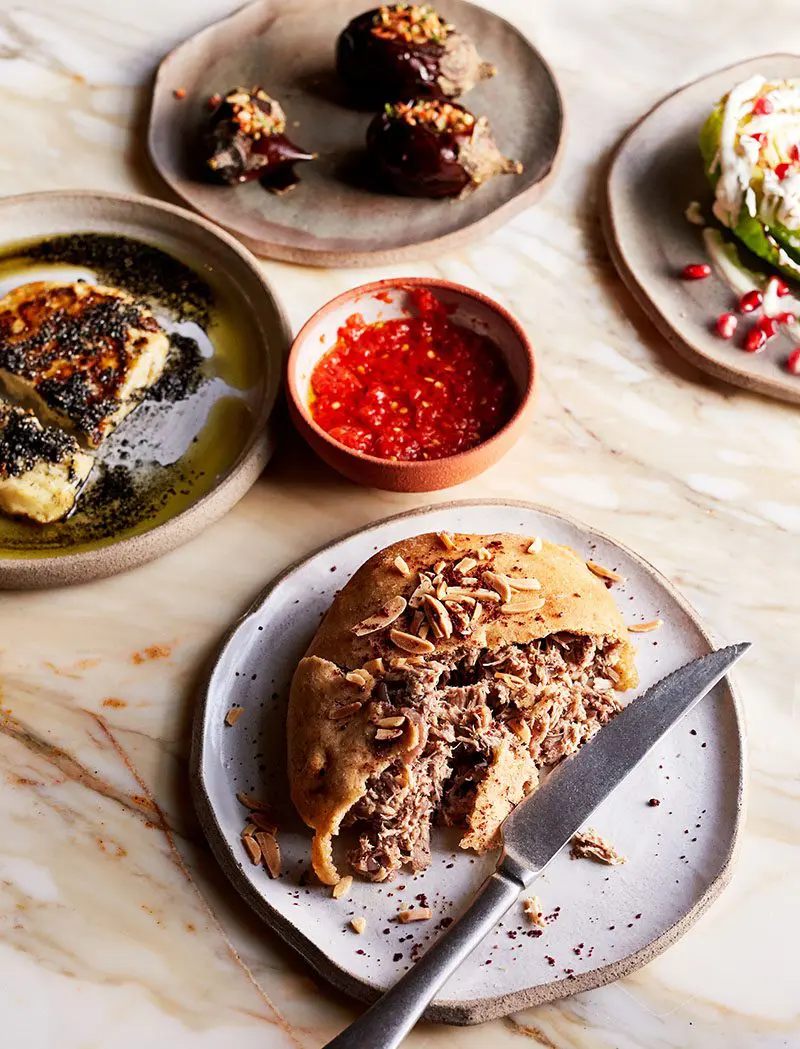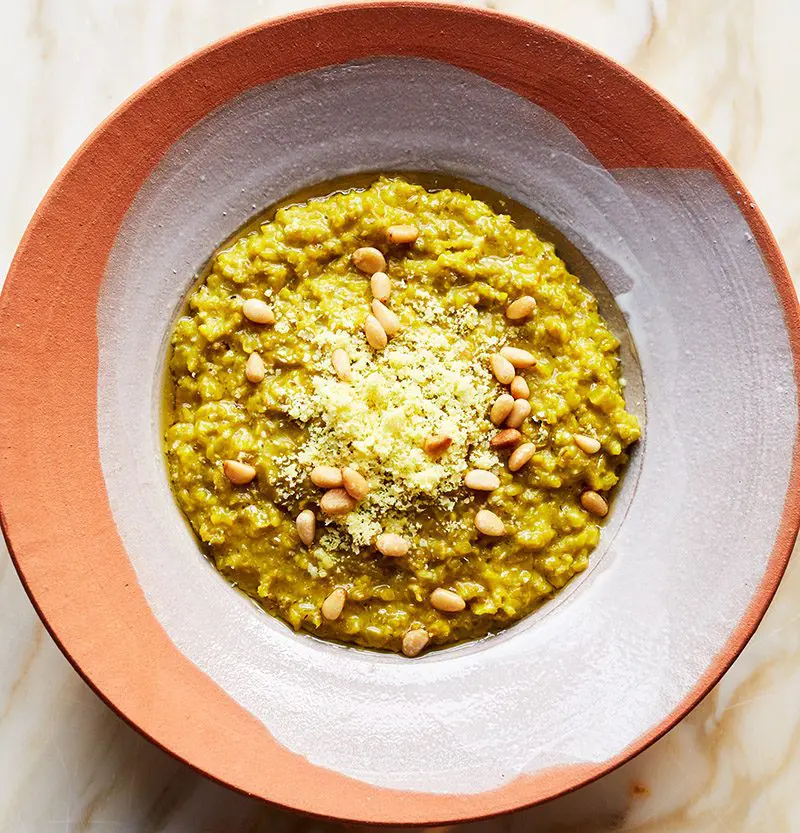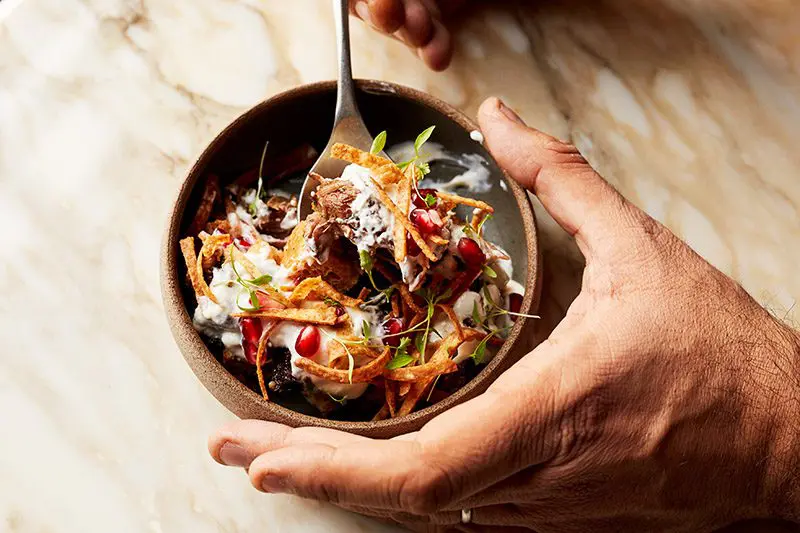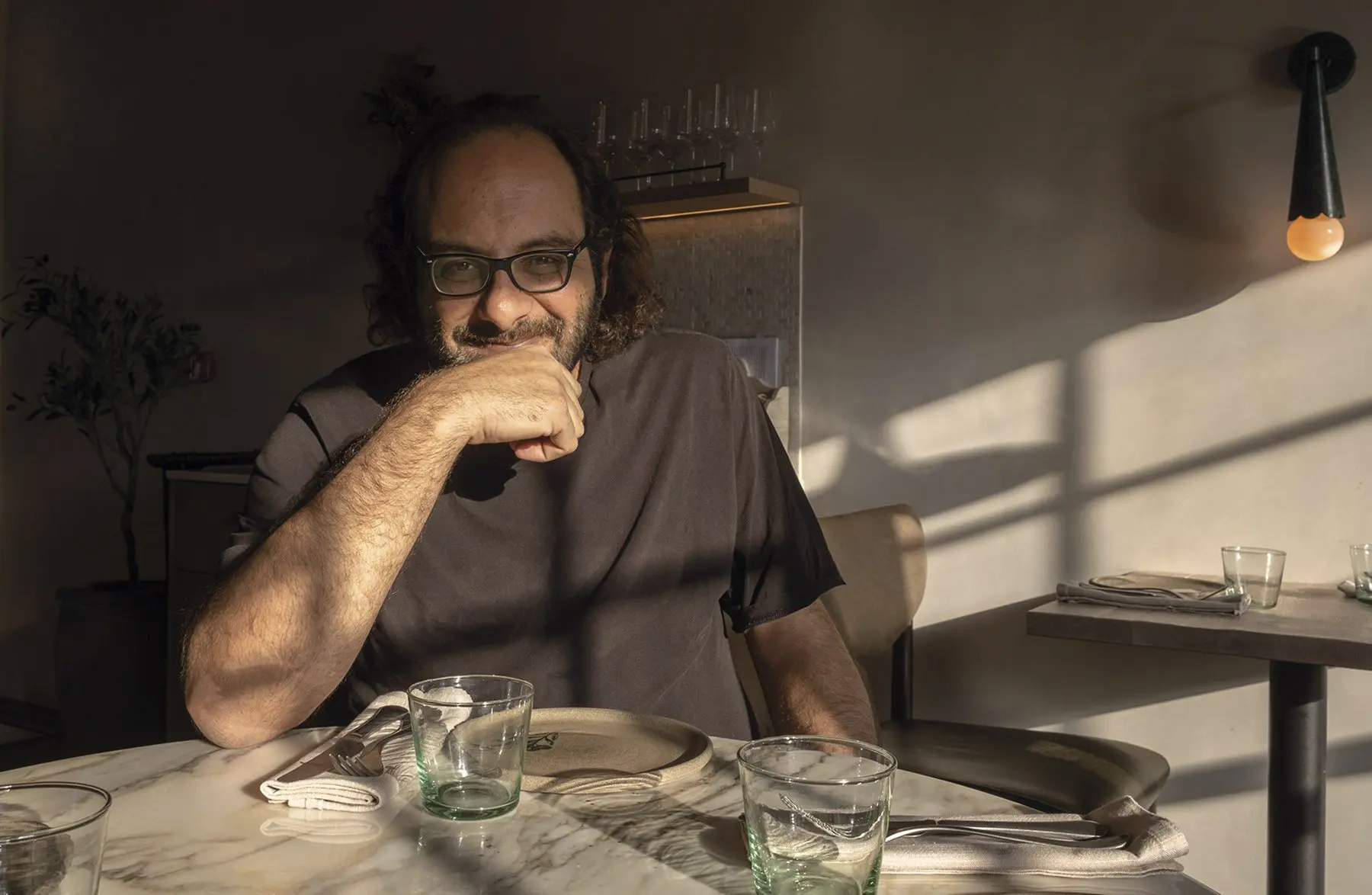A Taste of Bethlehem
Chef Fadi Kattan is passionate about preserving the traditions of Palestinian cooking.
By Catherine Mazy
The Arab world is vast, yet, like the language, its cuisine shares certain common characteristics from country to country: fresh herbs like mint, spices like cumin, nuts, figs, dates, lamb, rice…And yet, in the skinny strip that is Palestine, local cuisine can vary wildly from city to city. Knafeh is made with cheese and flour or semolina dough on top in Nablus, without cheese but with a mixture of nuts and cinnamon in Gaza, and with vermicelli topped with cinnamon, walnuts, and orange blossom syrup in Bethlehem.
“Local usually means within 200 kilometres of a city,” says Fadi Kattan, chef of Fawda restaurant in Bethlehem and Akub in London. “In Palestine, that doesn’t make sense, at least east-west. You would end up in Jordan or the Mediterranean.”
Adversity adds to the local flavour. Without access to springs or pumped water, farmers must make the most of the country’s meagre rainfall with native crops adapted to the climate. Without means to buy inputs like pesticides and fertilisers, farmers raise organic crops by default, relying on compost they make themselves. Livestock graze where they can, and their meat and milk hold hints of the herbs growing on the land. “It’s the essence of terroir,” Kattan says. “What soil is where, and how much sun there is and how much water.”

Some of the flavourful dishes at Akub. Charred cabbage drizzled in rich garlic yoghurt; Bukjet Mousakhan, an ingenious reinterpretation of traditional musakhan; Nabulsi cheese grilled with nigella seed oil; and Kattan’s reimagination of Sheikh El Mahshi, baby aubergines stuffed with pickled carrots and herbs.
Take za’atar. “The leaves can vary in intensity quite stunningly,” he says. “Some leaves have practically no taste except for that lemony zing and others are a powerful bomb of flavour.” In the kitchen—especially a restaurant kitchen—that requires tasting and adjusting by, say, infusing oil for a short time with powerful leaves.
The serendipity of the day’s market is the foundation of Fawda, which means chaos. Without a set menu, Kattan designs a four-course meal according to what he finds on offer each day and according to diners’ preferences, such as being vegan. He doesn’t pre-order quantities and doesn’t bargain over the price—even if the onions are soft or the parsley is wilted. “Because it has taken the same amount of hard work,” he says. That said, he will buy amazing onions and perky parsley from another producer and use the lesser stuff for stock. Taste comes first, always. While he trained for classical French cuisine in France, he doesn’t obsess over cutting vegetables into perfect shapes—what counts is flavour, not appearance. “I’m not going to throw out a crooked cucumber,” he says. “And everybody knows the ugliest tomatoes taste the best.”
Fawda had to close for Covid-19, but Kattan hopes to reopen soon. In London, Akub (which means cardoon, a seasonal flowering thistle that embodies the essence of Palestine) has a regular menu and a stable of small, British producers. When he worked there in the late 1990s, “London was not a place you went to eat. It had a sad, drab food scene.” But things have changed dramatically, and London guests “have curiosity to try different flavours.”
Akub, while not a community restaurant, also draws Palestinians, including some born in the diaspora who were never allowed to visit their homeland. “You see how memories and nostalgia and longing can shape how you taste,” Kattan says.

Freekeh Risotto, served at Akub. Freekeh is a Palestinian grain of green durum wheat that is charred and rubbed to create a smoky flavour. Here, saffron adds a sweet floral note and laban jameed adds richness.
Some of the star ingredients of Palestinian cuisine include sumac, za’atar, laban jameed, olive oil, freekeh, maftoul (wheat grains, called marmaon in Bethlehem), figs, dates, apricots, bananas (the best are from Jericho), hawarneh (hedge mustard), and khobeisa, an edible geranium that’s seasonal and foraged.
Palestinians are proud of what they grow in their kitchen gardens, too. “Now it’s the season of sour cherries,” Kattan says. “Everybody says, ‘you have to taste my sour cherries. I have the best in town.’” However, “the most glorious of fruits is the orange, but it’s also the most controversial,” he says, noting that the famed groves of Jaffa were confiscated from Arab farmers in 1948. And the “most glorious” vegetable is akub, whose flower head is eaten, rather than the spiky leaves and stalks as in Europe. “It’s like an artichoke, with much more work,” he says.
Bethlehem means “house of meat” in Arabic, and the Awassi breed of lamb raised around the city has a particular taste, thanks in part to the plants they graze. “It has more lean meat with a large pouch of fat on the bottom of the back,” Kattan says. “It’s less gamey.”
In Aramaic and Hebrew, Bethlehem means “house of bread,” and the city lives up to that reputation, too.

Short Rib Fatteh reminds Kattan of his childhood.
For dishes, Bethlehem is known for stuffed courgettes and stuffed grape leaves. The courgettes grow just southeast of town. “It seems a lot of families would core and stuff the courgettes on Saturday evening and then on Sunday cook them slowly while they went to church,” he says. Bethlehem has a large population of Christians. “In Nablus, they would do the same thing, but for Friday.”
Musakhan is another staple, a dish of crispy chicken served with bread loaded with onions glazed in olive oil, sumac, and other spices. Maqluba or muquluba, or “upside down”, is the go-to dish for anybody who “doesn’t have time for prep work but can let the dish cook slowly on its own,” he says. The pot of rice has three versions: cauliflower and chicken, aubergine and lamb, or fried fish with a side of tomato, dill and chili pepper salad.
Kattan likes to play with flavours, putting fenugreek or arabic gums—traditionally used only for desserts—in savoury dishes. He wants to keep evolving while simultaneously championing Palestinian cuisine and preserving imperilled traditions. “There are two schools,” he says. “One is ‘we’re traditional and we’re not allowed to change’. That’s a school that will always exist. Another says, humbly, ‘we’re here to change things and we’re leaving nothing.’ Look at nouvelle cuisine—what’s left of that?”
Kattan’s north star is local produce—the seasons, the farmers, and the land that create such unique flavours. “It’s a question of expectations. Our grandparents were proud of local produce. Our parents and our generation experienced industrialisation and people leaving the core of old cities, creating a distance with produce. We have an educational role as cooks.”
PHOTOGRAPH OF FADI KATTAN BY AIYUSH PACHNANDA. ALL OTHER IMAGES COURTESY OF FADI KATTAN.




